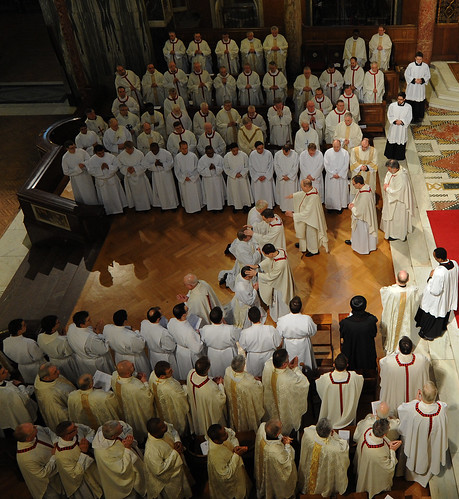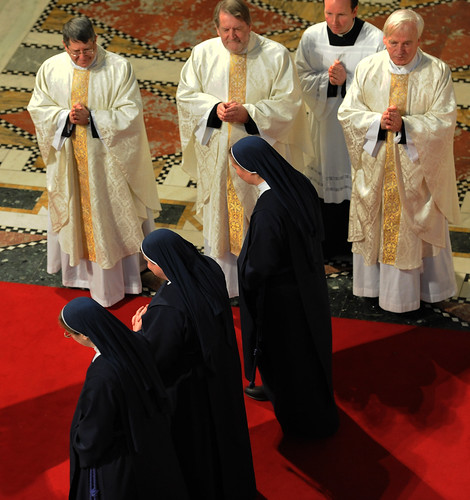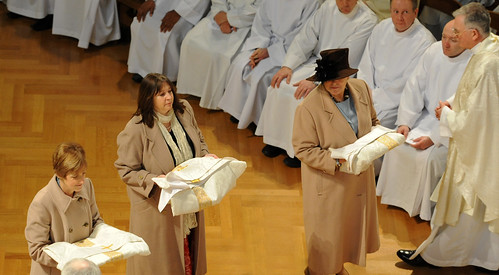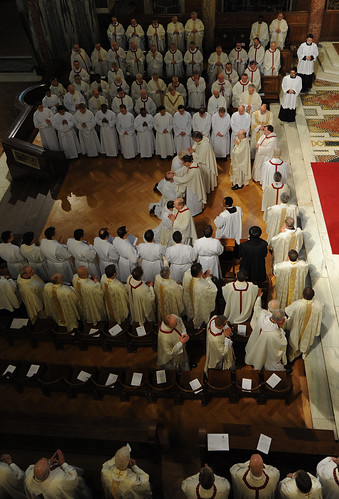 |
| And deliver us from women. Amen. |
 |
| Except maybe these three ... |
 |
| And of course these three. |
Last Sunday, three former Anglican bishops were ordained as priests in the Roman Catholic Church by Archbishop Vincent Nichols. Writing in last week's
Tablet, Allen Brent explains that men like himself, former Anglican priests who have been received into the Catholic Church and are now awaiting ordination in the ordinariate, are concerned not primarily about the ordination of women nor about gay issues but about the principle of unity enshrined in the concept of 'koinonia'. In other words, it is the breaching of unity brought about by the ordination of women and the consecration of gay unions that has created this mass deflection, and not 'misogynist and homophobic prejudices'. That may be true, and indeed I can remember when feminist author Sara Maitland became a Roman Catholic in the early 1990s, she offered a similar argument - and she is most certainly not a dyed-in-the-wool conservative. However, the onus is on the ordinariate, and most particularly on its priests, to allay any such suspicions in their practice and preaching.
But I must admit I feel an overwhelming sense of sadness about this ordinariate and what it means for both the Anglican and Roman Catholic churches. Not ony does it feel like a monumental rebuff to Catholic women campaigning for greater visibility and influence in the Church, but there is one issue in particular which has hardly been mentioned in the news coverage, but which seems to me to be one of the most important human aspects of this story. That is the situation of those Roman Catholic priests for whom compulsory celibacy is an almost impossible demand, and a monumental daily sacrifice that they are asked to make in order to be priests. What does this mean for those men, some of whom have served the Church faithfully for all their adult lives?
We hear so much about abusive and failed priests, and we should not underestimate the hugely destructive impact these men have had on the lives of their victims and on the reputation of the church. But we also need to bear in mind that the majority of Roman Catholic priests are ordinary men living what are, by modern standards, extraordinary lives of commitment and dedication, sometimes working in situations of considerable risk and hardship to minister to society's most unwanted and excluded members.
There are many Roman Catholic priests who have a vocation to the celibate life, and who insist that they are given the grace for what would otherwise be an impossible demand in the interests of their priesthood. I believe that celibacy is an indispensable gift to the Roman Catholic Church, not just for priests but for all who witness to an alternative way of channelling one's erotic energies in these sex-obsessed times, in lives of radical commitment to contemplation and prayer, and of active dedication to the poor and the outcast. But there are many, many priests who feel torn between their desire for marriage and family life and their vocation to the priesthood, and who do not experience the gift of celibacy in that way. What about those men, and why is it that the Catholic Church is willing to ordain former Anglican priests who are married, while still refusing to allIow its own priests to marry? I believe this constitutes a form of betrayal amounting to pastoral negligence, although in the present times it might be well nigh impossible for priests to come out and speak openly about the intensification of loneliness and conflict that this must produce.
For some Roman Catholic priests, the celebrations accompanying yet another influx of married men to the priesthood, this time with even fewer restraints and conditions than before, must be salt in a painful wound, particularly when they have to work on a daily basis with some of these priests. In these days of dwindling vocations and diminishing congregations, presbyteries can be lonely places. To go home to such a place every evening knowing that one's fellow priest is going home to his wife and children, must for some of our priests be almost unbearable. There is something inhuman about these double standards that now prevail in the Catholic priesthood.
There is no doubt that the decision to leave the Anglican communion has entailed a considerable sacrifice in terms of income, housing and long-term security for priests and bishops who are making the move. But I suspect that, for some of their Catholic priestly brethren, these sacrifices must pale into insignificance compared to that most basic sacrifice of all - the demand that they choose between priesthood and marriage. That is one choice that these new priests have never been asked to make.






